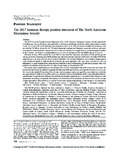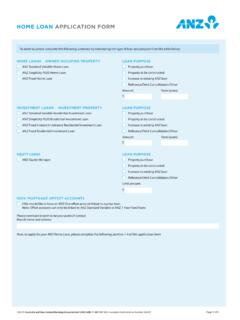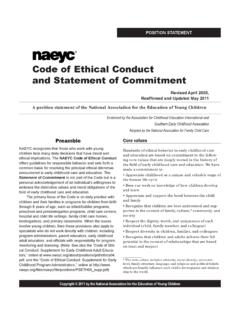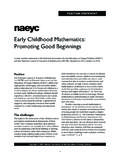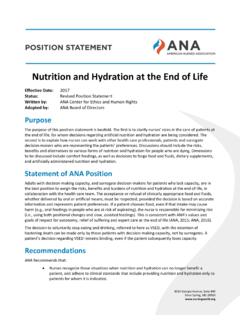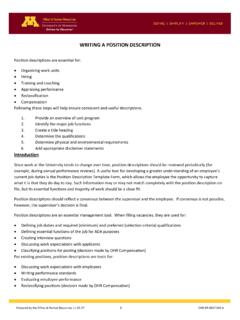Transcription of POSITION STATEMENT ON CLINICAL SUPERVISION
1 POSITION STATEMENT ON CLINICAL SUPERVISION . Purpose: The purpose of this POSITION STATEMENT is to clearly define the standards of expectation the Board has for SUPERVISION of associate licensees in order to protect the public and promote high standards of SUPERVISION of professional social work practice. Definition: SUPERVISION is that which is provided on a regular basis, conducted no less than once every two weeks at a rate of no less than (1) hour of SUPERVISION for every 30 hours of CLINICAL practice. It is an ongoing relationship designed to promote the development of responsibility, knowledge, skill, and ethical standards in the provision of CLINICAL social work services through the exploration of client-centered material.
2 The major focus in the supervisory process is accountability for client care within the parameters and ethical standards of the social work profession; including oversight and guidance in diagnosis and treatment of each client, review of documentation, and the provision of feedback and direction to the supervisee. SUPERVISION is a learning process with the goal of professional growth and competent self-directed professional practice. Qualifications of the Supervisor: The supervisor must possess a Master of Social Work degree from an educational institution with a graduate social work program accredited by the Council on Social Work Education. The supervisor must be a North Carolina Licensed CLINICAL Social Worker, in good standing, with two (2) years of full-time CLINICAL social work experience beyond the issuance of the LCSW credential.
3 (Please refer to NCGS 90B and Title 21, Chapter 63 of the NC Administrative Code .0211 regularly for any changes to this requirement). The supervisor should be an active participant in ongoing professional development related to the field of social work practice and SUPERVISION . This involves staying current with professional literature, attending workshops on CLINICAL practice and SUPERVISION , participating in advanced training seminars and peer consultation groups, and/or giving CLINICAL social work presentations. The CLINICAL supervisor should: Model the highest ethical standards and seek to enhance the supervisee's sensitivity to and knowledge of legal and ethical standards and issues.
4 Develop a supervisory contract with the supervisee that addresses frequency and cost (if applicable) of SUPERVISION , as well as access to records and confidential information. Insure that supervisees' clients are informed that the LCSWA is required to practice under SUPERVISION and that written consent to disclose information to the Supervisor is obtained. Have a clear understanding of social work practice and theory in general. Develop a supportive rapport with the supervisee while also maintaining an objective posture in order to effectively assess and address areas of strength as well as those needing improvement. Be skilled in helping the supervisee develop CLINICAL assessment and treatment skills through review of the treatment process, therapeutic techniques, exploration of treatment options and client resources.
5 Have expertise with the supervisee's client population and with the methods of practice the supervisee is employing. This requires an understanding of issues of diversity such as race, ethnicity, culture, language, age, gender, sexual orientation and physically or mentally challenged concerns. Demonstrate the ability to listen with sensitivity and empathy to the supervisee's feedback regarding the supervisory process and to provide appropriate support for this. Demonstrate effective oral and written communication with the supervisee. Demonstrate the ability and willingness to deal with difficult issues and provide constructive feedback to the supervisee.
6 Demonstrate an ability to recognize a supervisee's possible impairment and address this in a timely and appropriate manner with him/her, including referral when indicated. Recognize when it is necessary to secure consultation regarding his/her work with the supervisee. Assist the supervisee in developing a comprehensive emergency crisis plan that clearly outlines immediate access to a licensed mental health professional for emergency consultation, the hierarchy of initial contact person(s) and emergency backup contact(s). Model for the supervisee a commitment to the social work profession and to one's own continuing professional growth through participation in professional social work organizations and continuing education.
7 Conflict of Interest: SUPERVISION provided by the associate licensee's therapist, parents, spouse, former spouses, siblings, children, employees, or anyone sharing the same household or any romantic, domestic or familial relationship shall not be acceptable toward fulfillment of licensure requirements due to conflict of interest. For the purpose of this section, a supervisor shall not be considered an employee of the associate licensee if the only compensation received by the supervisor consists of payment for actual supervisory hours. A supervisor currently under sanction by this Board due to a disciplinary proceeding is not eligible to supervise an associate licensee.
8 A supervisor formerly disciplined by any professional credentialing body, including this Board, or professional organization may not provide SUPERVISION without the explicit written permission of the Board [Reference 21 NCAC 63 .0211(a)(2)]. POSITION STATEMENT ON INDEPENDENT/PRIVATE PRACTICE FOR THE LCSWA. The NCSWCLB strongly discourages independent private practice by associate licensees (LCSWA) and will closely examine practice outside the structure of a public agency. NC General Statute 90B-7 (f) and Section .0210 (d) & (e) of the North Carolina Administrative Code both mandate that a Licensed CLINICAL Social Worker Associate (LCSWA). must practice with appropriate CLINICAL SUPERVISION and immediate access to emergency CLINICAL backup during this associate licensure period.
9 This statute is intended to protect the client and the LCSWA during the supervised practice period. The Board will not approve practice arrangements for a LCSWA unless it is fully satisfied that clients and the public will be protected through close SUPERVISION of each CLINICAL case by a Licensed CLINICAL Social Worker who holds an MSW from a CSWE accredited school of social work. The CLINICAL supervisor assumes responsibility along with the LCSWA for the assessment for treatment, diagnosis, treatment planning, CLINICAL interventions, appropriate use of the treatment relationship, referrals, case documentation, reports, collateral contacts, termination of treatment, and all other such activity for each client case under the care of the LCSWA.
10 In addition to SUPERVISION the Board must be satisfied that there is a plan for 24 hour emergency consultation and backup for the LCSWA with a NC licensed mental health professional. The Board expects the mental health practitioner (which may be the CLINICAL supervisor), with the associate licensee to develop a crisis management plan that would provide the LCSWA licensee with immediate access to emergency backup and consultation. ---------------------------------------- ---------------------------------------- ----------------------------------- All LCSWA licensees need to describe and submit to the Board your emergency crises plan on a separate piece of paper or on the attachment provided.
